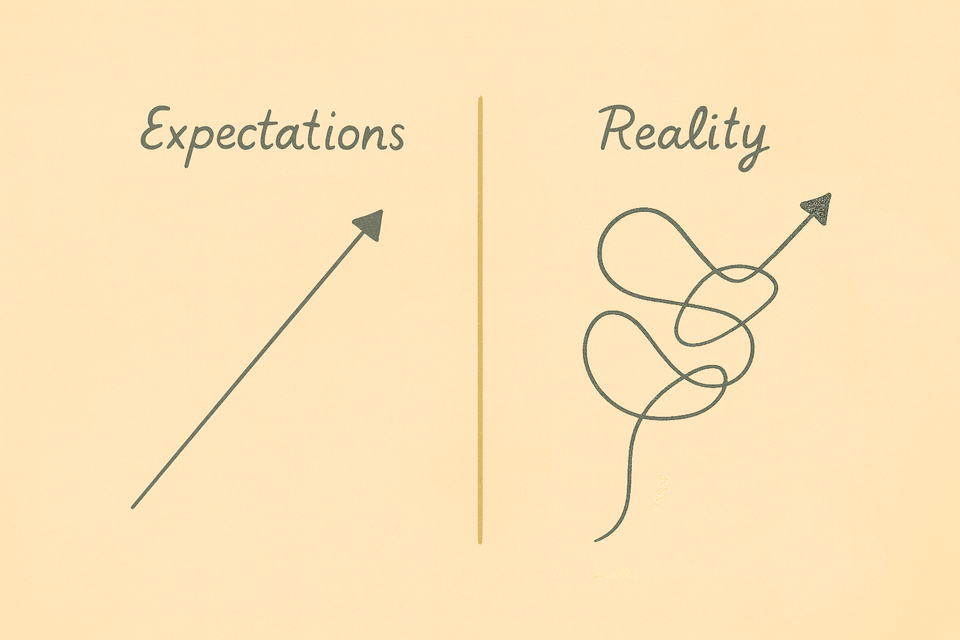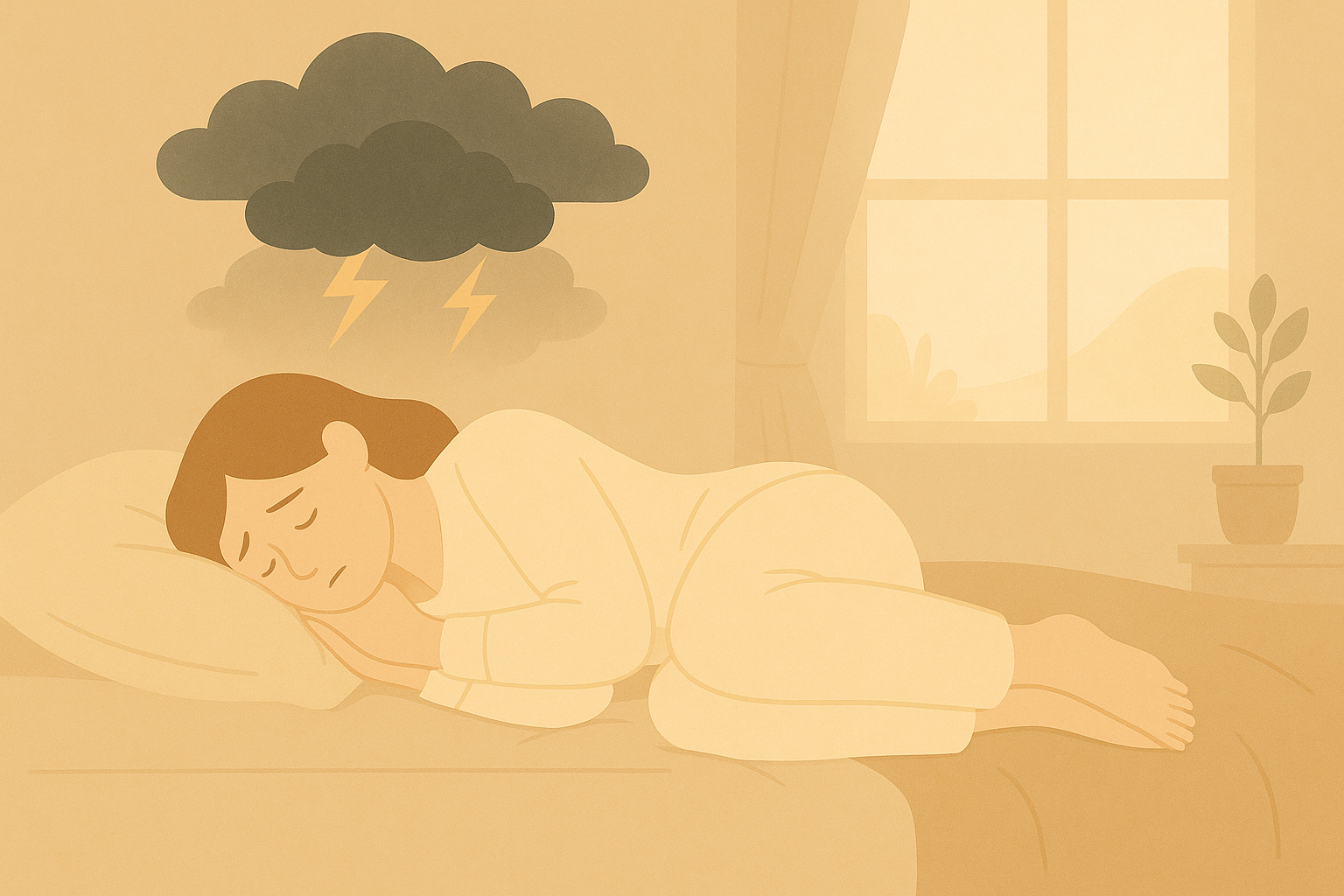Dealing with dips and setbacks

We all hear that recovery from chronic illnesses is not linear, that it is made of up and downs. But even if you know that, this journey can be extremely frustrating (believe me, I know).
When you break your ankle, doctors can predict pretty accurately what is going to happen. The improvement will overall be linear on a given period of time. But recovery from chronic illness don’t follow those rules, and it can feel chaotic, long and unpredictable.
In this post I’m going to share what helped me deal with these unavoidable setbacks. I realized that the best I deal with setbacks, the better is my progress afterwards. Allowing ebbs and flows along the way may be the most important part of recovery!
What does a setback look like?
1- What is it?
Once you start getting better, even if you are working with great pacing techniques, you will inevitably encounter things like:
- Temporary symptom increases: more fatigue, more brain fog, more of any of your habitual symptoms, or sometimes even new symptoms showing up.
- Difficult emotions: low mood, more anxiety, frustration, anger, discouragement
- Negative thoughts: rumination, catastrophic thinking, self-criticism especially if symptoms go up ("this is all my fault, I messed up again...")
- And often... a mix of all of that.
2- When does it happen?
Setbacks may occur after:
- An expansion phase:
- you did a bit more activity (physical, cognitive or emotional)
- you tried something new that you hadn’t done in a while...
- A more demanding phase:
- you had to deal with an unexpected stressor
- you went through a highly emotional moment (positive or negative)
- you had to do something that was outside of your current capacity
- a trigger brought you back to past trauma, consciously or not
- And sometimes… you can't pinpoint why it happened but it still happened 🤷♀️
Setbacks can last a few hours, a few days, or more. They result in a temporary decrease of your overall capacity, forcing you to pull back.

I know setbacks are extremely discouraging and feel like all progress is lost... but it's not the case. Setbacks often signal that your system is adjusting or processing change, not that you’re going backwards.
Yes, what I call a "setback" is what's medically described as "post-exertional malaise" (PEM). Over time, I realized that how I name these moments deeply affects how I experience them. Terms like "PEM" or "crash" are heavy, scary, and it always brought a sense of guilt for me. So I chose to stop using them.
Many people in recovery have found softer words:
adjustment period, dip, flare-up, or setback.
3- Why does it happen?
Setbacks happen when your nervous system becomes temporarily overwhelmed: when it needs to restore balance after working a lot.
It warns you the only way it knows how: by switching back to "danger" states (fight/flight/freeze), and forcing you to slow down. And these states generate difficult symptoms, emotions and thoughts (more details about nervous system states here).
Setbacks are not your fault.
They are your nervous system naturally adjusting and processing new information. It is your brain taking time to learn that living is safe again. That is why ups and downs are completely expected in recovery. Cycles of expansion and contraction serve a purpose, and they are a normal way of functioning for every living organism.
What helps me during setbacks?
Setbacks are not pleasant, and let's be clear: I still hate them. 😅 But I found a few ways to make them more bearable and help my nervous system recover quicker:
- Don't fight it, don't push through!
It will only fuel the danger response and make the setback last longer. Acceptance is not giving up: it is a message of safety. Lean into things, give your body and mind the best care you can, and slow down (here are some ideas for resourceful rest).
- Let go of the guilt, all of this is temporary
Setbacks are never your fault. Even if you went a little bit "too fast" in increasing activity and your symptoms are a bit more difficult to deal with this time... it's okay. Visualize it as a storm: it is scary, it is unpleasant, but it will pass.
- Setbacks are an opportunity for more progress afterwards
I see setbacks as "nervous system soreness" after activity expansion, just like the body gets sore after a great training! When you stay calm with your symptoms, you signal to your brain that the danger response is not needed anymore. Most of the work is done here!
- Remember that setbacks mess up your nervous system state
Difficult emotions and thoughts will arise because "the story follows the state". Remember that these emotions and thoughts are not you, they are just one more symptom. Allow them to pass through, you don't need to pay much attention to them.
And this other symptom was replaced by a new one!
Why??
Here are 2 important additional concepts about symptoms caused by nervous system dysregulation:
Symptom imperative
Symptoms will appear, move and change along the way, because your brain wants your attention. I experienced 60 different symptoms over 2 years, which did exactly that: came and went, all over the body, changed in nature and in intensity, without any clear medical reason (learn more).
Extinction bursts
At some point in your recovery, old symptoms may resurface. It is your brain testing you, asking: "Are you SURE we're safe??". Yes you are. It’s like when you stop feeding a habit: it flares up one last time before disappearing (learn more).
These shifts don’t mean something is worsening. They’re signs of the nervous system recalibrating.
Conclusion
When I started my journey, my setbacks would be very intense and last for weeks. But as I'm progressing, and as I'm cultivating more compassion for myself, setbacks are becoming less intense and less long.
Again, don't get me wrong... I'm writing this draft while dealing with a setback. It's still a very hard moment to go through, every time. But I'm trying to find as much grace as I can in those moments.
Each time you move through a setback with confidence and patience, your nervous system learns safety a bit more. That’s how progress builds up over time.
